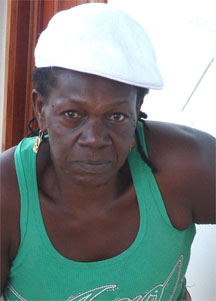By John Richards
Fifty-two-year-old Mathilda Leone is one of Guyana’s veteran porkknockers. Coming from a family of miners she has worked in over four different mining communities and feels the time has come for a change in the way women miners are treated.
Leone was born in St Lucia and migrated to Guyana over 40 years ago, where she followed in her parents’ footsteps and took up mining. As a child, she spent years in Mazaruni, but then she decided to venture out into the Potaro region to continue on her own because she said mining made her feel independent. She later moved to Mahdia where she raised her 13 children and continued mining in the region.
Life became harder as the price for the mineral went up and they were being bullied out of business by coastlanders, she said. However, over the years, she learnt that mining called for focus, discipline, tolerance and patience.

As a woman, her rights were often challenged, she said, but she knew how to stand up to the men who wished to bully her.
She recalled that she used to challenge the men to work with them and often outshone them. She said that she once dug an 11-foot pit, which she is still proud of.
For Leone, mining is a game of luck and chance, because according to her experience, sometimes you work for months and do not reap anything for your labour and someone comes and digs two feet off and strikes gold.
However, now there is a lot of improved technology, she said, referring mainly to the Global Positioning System (GPS) and metal detectors which make things a bit easier for miners.
She praised the Guyana Women Miners Organization for stepping up and trying to improve the standards of women miners today since it is hard for her to recall any substantial assistance from the government or any other authority.
She said there are some similarities between the way men and women mine in the district, but women are still seen as inferior to the male miners and bullied.
One serious issue, she pointed out, was the trafficking of young people in the “bush”. According to her both boys and girls are exploited. The boys, she said, are forced to work for little or no pay and are forced to commit illegal acts or are beaten when they fail to follow instructions. The girls are brought to work in restaurants in the backdam and are forced to sleep with the men in the backdam, she said, adding that on several occasions she has stepped in to rescue victims and whether she succeeds or not she is ridiculed and called derogatory names. But that does not stop her, she said, because she has both sons and daughter so she feels for them.
She said if the authorities could clamp down hard enough on this trafficking situation and help the children it would certainly change the situation in Mahdia.
Nevertheless Leone prefers Mahdia to all the other mining districts and communities that she has worked in; the reason being that the cost of living is much lower than the others. For her it’s a bit hard sometimes to sell her gold because there is no gold board in Mahdia.
On the social side, she thinks that the officials put in charge of the community, since they are relatively new and know nothing about the community, are causing the standard to drop rather than improve.
She said she remembers parents of school children going to clean the school toilets, but that collective effort is no more and the school environment is deteriorating. The same, according to her, can be said for the health system. There is no proper service in place at the health centre and there is only one lab technician and limited nurses and doctors.
She is also concerned about the apparent current segregation, where Amerindians have moved to seclude themselves in Campbell Town, which is a part of Mahdia, and prevent residents of the other half of Mahdia from entering the market in Campbell town.
Apart from mining, Leone is also a ‘herbalife’ member, which is a group that focuses on using plants and herbs to make medicine for numerous ailments and care.
Her call to the ministry of Natural Resources is for provisions for pork knockers in policy making, when it comes to the land use in Mahdia as well as all other mining areas.





